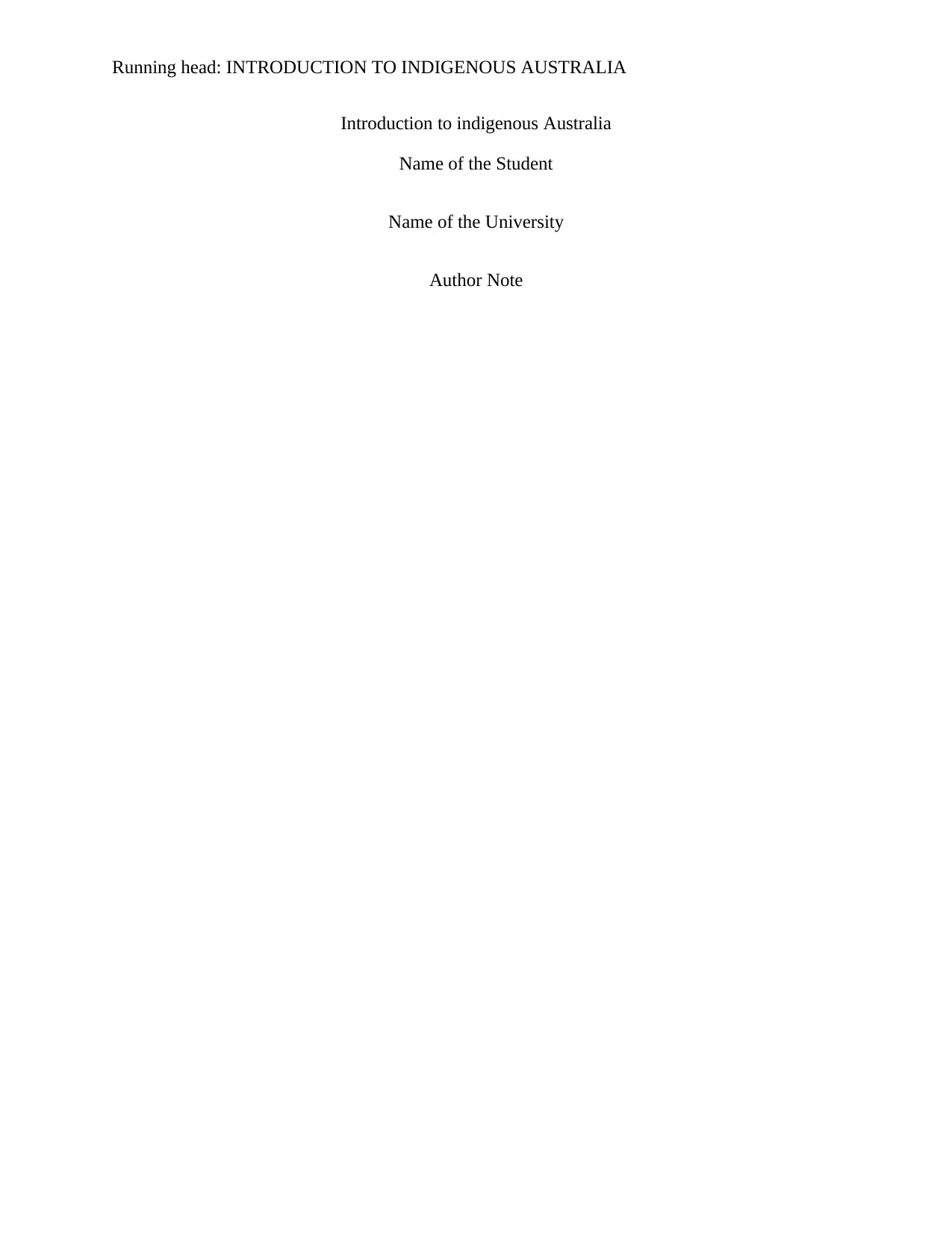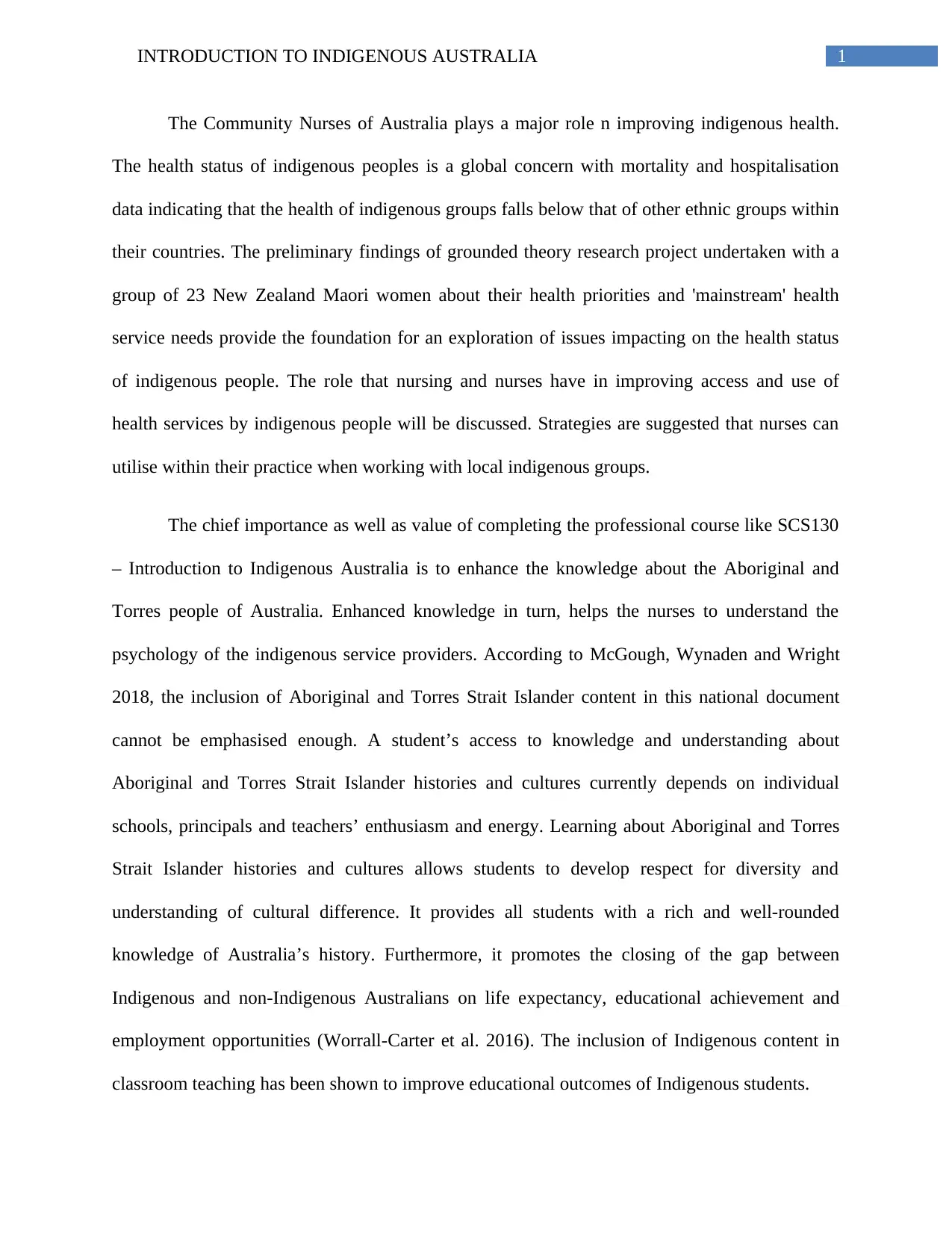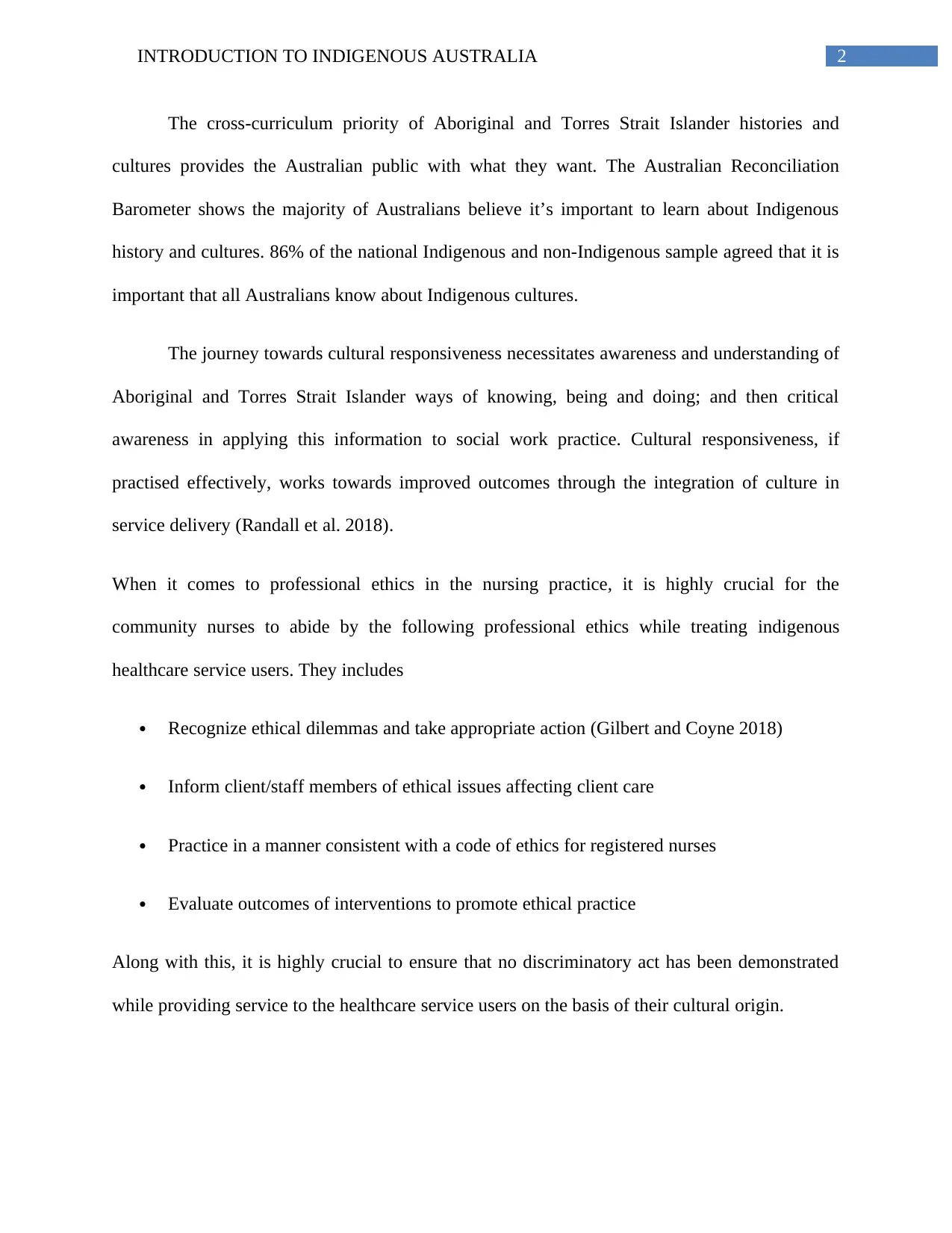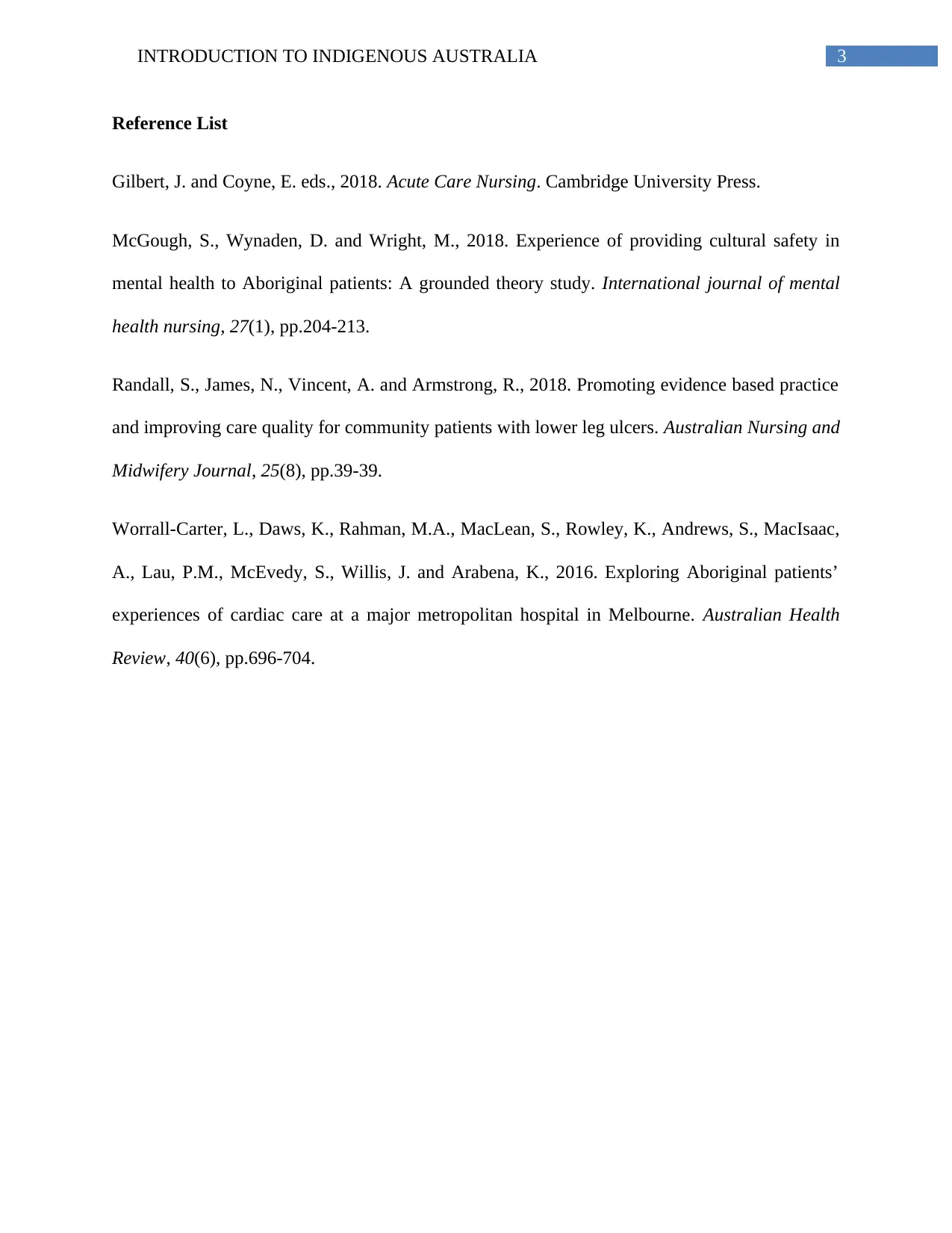Nursing Essay: Introduction to Indigenous Australia - SCS130
VerifiedAdded on 2022/12/22
|4
|797
|91
Essay
AI Summary
This essay provides an introduction to Indigenous Australia, focusing on the role of community nurses in improving Indigenous health outcomes. It highlights the importance of cultural responsiveness and ethical considerations in nursing practice. The essay references a grounded theory research project and emphasizes the need for Aboriginal and Torres Strait Islander content in education to promote respect for diversity and close the gap in health and education outcomes. It also discusses the significance of cultural awareness in service delivery and outlines key professional ethics for nurses working with Indigenous healthcare users, including recognizing ethical dilemmas and ensuring non-discrimination. The essay references key studies and publications supporting the importance of cultural competency in healthcare.

Running head: INTRODUCTION TO INDIGENOUS AUSTRALIA
Introduction to indigenous Australia
Name of the Student
Name of the University
Author Note
Introduction to indigenous Australia
Name of the Student
Name of the University
Author Note
Paraphrase This Document
Need a fresh take? Get an instant paraphrase of this document with our AI Paraphraser

1INTRODUCTION TO INDIGENOUS AUSTRALIA
The Community Nurses of Australia plays a major role n improving indigenous health.
The health status of indigenous peoples is a global concern with mortality and hospitalisation
data indicating that the health of indigenous groups falls below that of other ethnic groups within
their countries. The preliminary findings of grounded theory research project undertaken with a
group of 23 New Zealand Maori women about their health priorities and 'mainstream' health
service needs provide the foundation for an exploration of issues impacting on the health status
of indigenous people. The role that nursing and nurses have in improving access and use of
health services by indigenous people will be discussed. Strategies are suggested that nurses can
utilise within their practice when working with local indigenous groups.
The chief importance as well as value of completing the professional course like SCS130
– Introduction to Indigenous Australia is to enhance the knowledge about the Aboriginal and
Torres people of Australia. Enhanced knowledge in turn, helps the nurses to understand the
psychology of the indigenous service providers. According to McGough, Wynaden and Wright
2018, the inclusion of Aboriginal and Torres Strait Islander content in this national document
cannot be emphasised enough. A student’s access to knowledge and understanding about
Aboriginal and Torres Strait Islander histories and cultures currently depends on individual
schools, principals and teachers’ enthusiasm and energy. Learning about Aboriginal and Torres
Strait Islander histories and cultures allows students to develop respect for diversity and
understanding of cultural difference. It provides all students with a rich and well-rounded
knowledge of Australia’s history. Furthermore, it promotes the closing of the gap between
Indigenous and non-Indigenous Australians on life expectancy, educational achievement and
employment opportunities (Worrall-Carter et al. 2016). The inclusion of Indigenous content in
classroom teaching has been shown to improve educational outcomes of Indigenous students.
The Community Nurses of Australia plays a major role n improving indigenous health.
The health status of indigenous peoples is a global concern with mortality and hospitalisation
data indicating that the health of indigenous groups falls below that of other ethnic groups within
their countries. The preliminary findings of grounded theory research project undertaken with a
group of 23 New Zealand Maori women about their health priorities and 'mainstream' health
service needs provide the foundation for an exploration of issues impacting on the health status
of indigenous people. The role that nursing and nurses have in improving access and use of
health services by indigenous people will be discussed. Strategies are suggested that nurses can
utilise within their practice when working with local indigenous groups.
The chief importance as well as value of completing the professional course like SCS130
– Introduction to Indigenous Australia is to enhance the knowledge about the Aboriginal and
Torres people of Australia. Enhanced knowledge in turn, helps the nurses to understand the
psychology of the indigenous service providers. According to McGough, Wynaden and Wright
2018, the inclusion of Aboriginal and Torres Strait Islander content in this national document
cannot be emphasised enough. A student’s access to knowledge and understanding about
Aboriginal and Torres Strait Islander histories and cultures currently depends on individual
schools, principals and teachers’ enthusiasm and energy. Learning about Aboriginal and Torres
Strait Islander histories and cultures allows students to develop respect for diversity and
understanding of cultural difference. It provides all students with a rich and well-rounded
knowledge of Australia’s history. Furthermore, it promotes the closing of the gap between
Indigenous and non-Indigenous Australians on life expectancy, educational achievement and
employment opportunities (Worrall-Carter et al. 2016). The inclusion of Indigenous content in
classroom teaching has been shown to improve educational outcomes of Indigenous students.

2INTRODUCTION TO INDIGENOUS AUSTRALIA
The cross-curriculum priority of Aboriginal and Torres Strait Islander histories and
cultures provides the Australian public with what they want. The Australian Reconciliation
Barometer shows the majority of Australians believe it’s important to learn about Indigenous
history and cultures. 86% of the national Indigenous and non-Indigenous sample agreed that it is
important that all Australians know about Indigenous cultures.
The journey towards cultural responsiveness necessitates awareness and understanding of
Aboriginal and Torres Strait Islander ways of knowing, being and doing; and then critical
awareness in applying this information to social work practice. Cultural responsiveness, if
practised effectively, works towards improved outcomes through the integration of culture in
service delivery (Randall et al. 2018).
When it comes to professional ethics in the nursing practice, it is highly crucial for the
community nurses to abide by the following professional ethics while treating indigenous
healthcare service users. They includes
Recognize ethical dilemmas and take appropriate action (Gilbert and Coyne 2018)
Inform client/staff members of ethical issues affecting client care
Practice in a manner consistent with a code of ethics for registered nurses
Evaluate outcomes of interventions to promote ethical practice
Along with this, it is highly crucial to ensure that no discriminatory act has been demonstrated
while providing service to the healthcare service users on the basis of their cultural origin.
The cross-curriculum priority of Aboriginal and Torres Strait Islander histories and
cultures provides the Australian public with what they want. The Australian Reconciliation
Barometer shows the majority of Australians believe it’s important to learn about Indigenous
history and cultures. 86% of the national Indigenous and non-Indigenous sample agreed that it is
important that all Australians know about Indigenous cultures.
The journey towards cultural responsiveness necessitates awareness and understanding of
Aboriginal and Torres Strait Islander ways of knowing, being and doing; and then critical
awareness in applying this information to social work practice. Cultural responsiveness, if
practised effectively, works towards improved outcomes through the integration of culture in
service delivery (Randall et al. 2018).
When it comes to professional ethics in the nursing practice, it is highly crucial for the
community nurses to abide by the following professional ethics while treating indigenous
healthcare service users. They includes
Recognize ethical dilemmas and take appropriate action (Gilbert and Coyne 2018)
Inform client/staff members of ethical issues affecting client care
Practice in a manner consistent with a code of ethics for registered nurses
Evaluate outcomes of interventions to promote ethical practice
Along with this, it is highly crucial to ensure that no discriminatory act has been demonstrated
while providing service to the healthcare service users on the basis of their cultural origin.
⊘ This is a preview!⊘
Do you want full access?
Subscribe today to unlock all pages.

Trusted by 1+ million students worldwide

3INTRODUCTION TO INDIGENOUS AUSTRALIA
Reference List
Gilbert, J. and Coyne, E. eds., 2018. Acute Care Nursing. Cambridge University Press.
McGough, S., Wynaden, D. and Wright, M., 2018. Experience of providing cultural safety in
mental health to Aboriginal patients: A grounded theory study. International journal of mental
health nursing, 27(1), pp.204-213.
Randall, S., James, N., Vincent, A. and Armstrong, R., 2018. Promoting evidence based practice
and improving care quality for community patients with lower leg ulcers. Australian Nursing and
Midwifery Journal, 25(8), pp.39-39.
Worrall-Carter, L., Daws, K., Rahman, M.A., MacLean, S., Rowley, K., Andrews, S., MacIsaac,
A., Lau, P.M., McEvedy, S., Willis, J. and Arabena, K., 2016. Exploring Aboriginal patients’
experiences of cardiac care at a major metropolitan hospital in Melbourne. Australian Health
Review, 40(6), pp.696-704.
Reference List
Gilbert, J. and Coyne, E. eds., 2018. Acute Care Nursing. Cambridge University Press.
McGough, S., Wynaden, D. and Wright, M., 2018. Experience of providing cultural safety in
mental health to Aboriginal patients: A grounded theory study. International journal of mental
health nursing, 27(1), pp.204-213.
Randall, S., James, N., Vincent, A. and Armstrong, R., 2018. Promoting evidence based practice
and improving care quality for community patients with lower leg ulcers. Australian Nursing and
Midwifery Journal, 25(8), pp.39-39.
Worrall-Carter, L., Daws, K., Rahman, M.A., MacLean, S., Rowley, K., Andrews, S., MacIsaac,
A., Lau, P.M., McEvedy, S., Willis, J. and Arabena, K., 2016. Exploring Aboriginal patients’
experiences of cardiac care at a major metropolitan hospital in Melbourne. Australian Health
Review, 40(6), pp.696-704.
1 out of 4
Related Documents
Your All-in-One AI-Powered Toolkit for Academic Success.
+13062052269
info@desklib.com
Available 24*7 on WhatsApp / Email
![[object Object]](/_next/static/media/star-bottom.7253800d.svg)
Unlock your academic potential
Copyright © 2020–2026 A2Z Services. All Rights Reserved. Developed and managed by ZUCOL.





